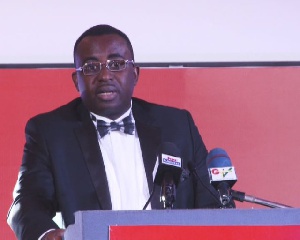 Second Deputy Governor of the Bank of Ghana, Dr. Johnson Asiamah
Second Deputy Governor of the Bank of Ghana, Dr. Johnson Asiamah
The second Deputy Governor of the Bank of Ghana, Dr. Johnson Asiamah, has called on the government to scrap stability agreements with mining companies to shore up the country’s earnings from the sector.
“Despite our aversion to the existing stability agreements, the mining sector continues to repatriate significant amounts of export earnings,” he said to industry players at this year’s Ghana Mining Industry Awards.
“I am looking forward anxiously to the day we will do away with stability agreements and at the same time obtain hundred percent repatriation even though the current repatriation is commendable,” he added.
Over the years, civil society organisations, in particular, have kicked against stability agreements, saying they have deprived source owners of much needed revenues and have not resulted in increased investments by mining firms as the excuse has been.
The stability agreement signed with Goldfields earlier in the year has been heavily criticised as a giveaway deal, as the Ministry of Finance was reported to have granted tax concessions to the company following a 500 million dollars investment.
Third World Network Position
The Third World Network, a Civil Society Organisation, at the time described as illegal the agreement between the government of Ghana and Goldfields Ghana Limited.
According to the Network, Parliament’s waiving of a notice period and ratifying the development agreement raises questions which needed to be answered.
The coordinator of the network, Dr Yao Graham, said the new agreement also had a fiscal stability agreement which granted royalty and tax concession to the mining company, which was too much of a giveaway to one company at the time.
Minister justifies Gov’t, Gold Fields agreement
The Minister of Lands and Natural Resources, Nii Osah Mills, justified the development agreement between government and Gold Fields Ghana Limited, arguing that the allegation that the agreements’ net-benefits are not favourable to government is not supported by the facts.
He indicated that the proposed US$2.55billion investment secured by the agreements will lead to increased revenues for government beyond the perceived current losses to the state.
Renegotiation of mining stability agreement committee
The Government of Ghana, in 2012, set up a seven-member team to review and re-negotiate stability agreements it had entered into with some mining companies to ensure that the country derived maximum benefits from its resources.
The then Finance Minister, Dr Kwabena Duffuor, who inaugurated the team, said the review was necessary as the nation had benefited little from dividends and record world prices of gold.
Government has actually been trying to introduce a windfall profit tax, which could help the nation earn a share when gold prices rise beyond a certain level.
But the mining companies came down heavily on the move, threatening, as always, to lay off staff if a law to that effect is introduced.
The renegotiation team, which was headed by Professor Akillapga Sawyerr, was also to determine the extent to which the stability agreements depart from all mining leases granted to other mining companies and redesign any existing mining agreement and/or draft new agreement, where necessary, to ensure support for Ghana’s economic growth and development.
But the committee has complained severally of the fact that government has been side-stepping it and undermining its work by going ahead to sign agreements with mining companies.